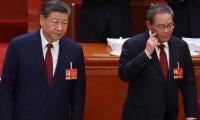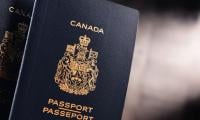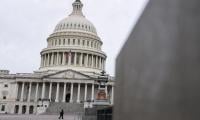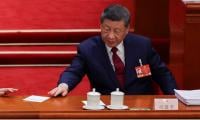Transporters demand regularisation of auto rickshaws
KarachiHuman Rights Network (Karachi chapter) and representatives of Qingqi Auto-rickshaw Association on Tuesday announced to launch a campaign in collaboration with the Transport Ittehad for the regularisation of auto-rickshaws in the city. They said that Qingqi rickshaws were a cheap and easy mode of transport for a large number of
By Shahid Husain
August 13, 2015
Karachi
Human Rights Network (Karachi chapter) and representatives of Qingqi Auto-rickshaw Association on Tuesday announced to launch a campaign in collaboration with the Transport Ittehad for the regularisation of auto-rickshaws in the city.
They said that Qingqi rickshaws were a cheap and easy mode of transport for a large number of people in the city and province and their absence would cause great inconvenience to frequent users of public transport.
Speaking at a joint press conference at the KPC, the president of Human Rights Network Alam Soori said the ban on Qingqi rickshaws had created a crisis of public transport in the city. He said even though the ban did not apply to three-wheeler auto rickshaws but they were still being unduly harassed by the traffic police.
Soori said many rickshaw drivers had paid fines to the tune of between Rs5,000 and Rs7,000 even when their vehicles were in police custody. He demanded regularisation of all auto rickshaws in order to overcome the crisis and called for a system of mass transit system in the city.
Shehzad Mazhar, Tariq Khan and representatives of the Qingqi Auto-rickshaw Association also addressed the news conference and said daily commuters, especially students and women, were the most affected by the transport crises created by the ban on six-seater Qingqis.
They said at present there were around 10,000 public transport vehicles plying in the city. He said the 1500 buses, 4,500 mini buses and 4,000 coaches were insufficient to cater to the needs of 20 million people of the megapolis, when 14 years the total number of public transport vehicles in the city were around 22, 313.
They said 65,000 Qingqis, while 30,000 CNG auto-rickshaws and 100,000 three-seaters had been plying on the roads and they had been fined to the tune of Rs10 million. “As many as 28,000 CNG rickshaws have been fined during the past week only,” he said. “If the government regularises them then it can earn revenue from their earnings.”
Human Rights Network (Karachi chapter) and representatives of Qingqi Auto-rickshaw Association on Tuesday announced to launch a campaign in collaboration with the Transport Ittehad for the regularisation of auto-rickshaws in the city.
They said that Qingqi rickshaws were a cheap and easy mode of transport for a large number of people in the city and province and their absence would cause great inconvenience to frequent users of public transport.
Speaking at a joint press conference at the KPC, the president of Human Rights Network Alam Soori said the ban on Qingqi rickshaws had created a crisis of public transport in the city. He said even though the ban did not apply to three-wheeler auto rickshaws but they were still being unduly harassed by the traffic police.
Soori said many rickshaw drivers had paid fines to the tune of between Rs5,000 and Rs7,000 even when their vehicles were in police custody. He demanded regularisation of all auto rickshaws in order to overcome the crisis and called for a system of mass transit system in the city.
Shehzad Mazhar, Tariq Khan and representatives of the Qingqi Auto-rickshaw Association also addressed the news conference and said daily commuters, especially students and women, were the most affected by the transport crises created by the ban on six-seater Qingqis.
They said at present there were around 10,000 public transport vehicles plying in the city. He said the 1500 buses, 4,500 mini buses and 4,000 coaches were insufficient to cater to the needs of 20 million people of the megapolis, when 14 years the total number of public transport vehicles in the city were around 22, 313.
They said 65,000 Qingqis, while 30,000 CNG auto-rickshaws and 100,000 three-seaters had been plying on the roads and they had been fined to the tune of Rs10 million. “As many as 28,000 CNG rickshaws have been fined during the past week only,” he said. “If the government regularises them then it can earn revenue from their earnings.”
-
 Oil And Gas Price Spike Might Lead Countries To Seek Alternative
Oil And Gas Price Spike Might Lead Countries To Seek Alternative -
 China Grapples With Slowest Economic Growth In Decades Amid Global Pressures
China Grapples With Slowest Economic Growth In Decades Amid Global Pressures -
 Marlon Wayans Drops Bombshell Statement About 'cancel Culture' Ahaed Of 'Scary Movie 6'
Marlon Wayans Drops Bombshell Statement About 'cancel Culture' Ahaed Of 'Scary Movie 6' -
 Khloe Kardashian Considering Having Third Child 'on Her Own'
Khloe Kardashian Considering Having Third Child 'on Her Own' -
 Nick Blankenburg Acquired By Avalanche From Predators In NHL Trade Deal
Nick Blankenburg Acquired By Avalanche From Predators In NHL Trade Deal -
 Cardi B’s Ex Steffon Diggs Faces Major Setback Post Breakup
Cardi B’s Ex Steffon Diggs Faces Major Setback Post Breakup -
 Hornets Vs Celtics: Charlotte Earns Sixth Straight Win In 118-89 Victory
Hornets Vs Celtics: Charlotte Earns Sixth Straight Win In 118-89 Victory -
 Morgan Evans Reveals Where His Relationship With Laci Kaye Booth Stands Now
Morgan Evans Reveals Where His Relationship With Laci Kaye Booth Stands Now -
 Costco Canada Recalls Dessert Nationwide Over Potentially Life-threatening Allergens
Costco Canada Recalls Dessert Nationwide Over Potentially Life-threatening Allergens -
 Population Growth In Canada Expected To Rely Fully On Immigration As Birth Rates Decline
Population Growth In Canada Expected To Rely Fully On Immigration As Birth Rates Decline -
 Why Jack Wagner And Wife Michelle Wolf Are Not Living Together
Why Jack Wagner And Wife Michelle Wolf Are Not Living Together -
 NATO Air Defence Systems Stop Iranian Missile Heading Toward Turkiye
NATO Air Defence Systems Stop Iranian Missile Heading Toward Turkiye -
 Cruz Beckham Sends Birthday Message To Estranged Brother Brooklyn Despite Reported Rift
Cruz Beckham Sends Birthday Message To Estranged Brother Brooklyn Despite Reported Rift -
 Iran-US War: Senate Rejects Measure To Limit Trump’s Military Action
Iran-US War: Senate Rejects Measure To Limit Trump’s Military Action -
 Selena Gomez Opens Up About Mental Health Misdiagnosis
Selena Gomez Opens Up About Mental Health Misdiagnosis -
 Prince Edward Faces ‘hard Time’ In Accepting Andrew ‘disgrace ’
Prince Edward Faces ‘hard Time’ In Accepting Andrew ‘disgrace ’



